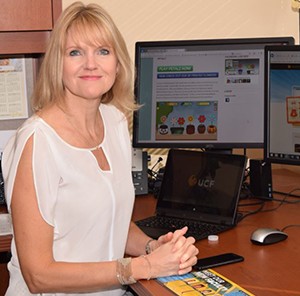Meet Assistant Director Andrea Adkins
October 21, 2015
 Andrea Adkins is an Assistant Director in the Office of Technology Transfer at the University of Central Florida. Andrea works with scientists and students, as well as legal and industry representatives, to protect and commercialize intellectual property originating from research and educational activities conducted at UCF. A UCF graduate with a Master of Science in Research Administration, Andrea joined UCF’s Office of Research & Commercialization in 1999. Prior to joining UCF, she worked in business development for the engineering and construction industries. She also co-founded and operated a small business providing manufacturers’ representative services.
Andrea Adkins is an Assistant Director in the Office of Technology Transfer at the University of Central Florida. Andrea works with scientists and students, as well as legal and industry representatives, to protect and commercialize intellectual property originating from research and educational activities conducted at UCF. A UCF graduate with a Master of Science in Research Administration, Andrea joined UCF’s Office of Research & Commercialization in 1999. Prior to joining UCF, she worked in business development for the engineering and construction industries. She also co-founded and operated a small business providing manufacturers’ representative services.
What is a typical day for you as a licensing associate?
Although I am an Assistant Director, many of my daily activities are focused on protecting and licensing intellectual property developed in the College of Engineering & Computer Science and the NanoScience Technology Center. What that really means is I spend my work day listening and learning about new discoveries in the labs, reading and responding to many and varied requests from inventors, patent attorneys, licensees, and prospective licensees, as well as drafting and reviewing legal agreements for licensing and sponsored research activities. I am also frequently asked to meet with visitors to the university labs to understand their interests in working with UCF and then recommending how we can work together to achieve the desired outcome, given my knowledge of the university’s policies and procedures.
I also spend time helping university staff and students understand university policies and procedures as it relates to intellectual property ownership and uses.
Tell us about your most successful licensing process.
Success is hard for me to quantify when it comes to licensing. And my bosses, or the inventors I serve, may answer this very differently. Is success simply a negotiated license agreement? Or, is it the amount of income generated by the university’s technology for the licensee, university and inventors? Or, is it a product or service that improves our lives? For example, I have licensed software that my fellow research administrators and researchers are using to do their jobs at campuses in New Mexico and Nevada. I have licensed technologies that improve water quality, provide radiation protection for healthy cells in cancer patients, and detect speeding vehicles on highways. I consider all of these a success.
While there isn’t one license experience or process that stands out to me more than another, one that surprised me the most was a request from Warner Brothers to license posters created by UCF’s College of Sciences for use on the hit TV show The Big Bang Theory. Although it generated no income for the university, the license process was easy and quick. The team at Warner Brothers was great to work with by being responsive and cooperative with university policies and procedures. Although I have watched many episodes of TBBT, I haven’t spotted one of UCF’s posters in a scene!
What insider tips would you share to researchers interested in licensing their technologies?
The process for protecting and licensing technologies is not quick, would be my first tip! And my second is that unless I receive a new invention disclosure before you publically disclose it, I may not have anything to protect and license. Lastly, in addition to your research and teaching responsibilities, be prepared to invest time for commercialization activities to ensure the best chance of success.
As many researchers know who are working closely with the Tech Transfer team, we all spend a lot of time on leads and requests for more information on the technologies developed in the lab. Usually an interested party wants to know if the researcher’s work included certain experiments or tested a particular use related to the business interests of the inquiring party. The time spent may possibly lead to a license or lab funding. It’s an investment in time that carries these rewards and risks.
Who is your ideal licensee?
My ideal licensee is one who works diligently with me to execute a license quickly. Post-license, the ideal licensee is one who delivers as agreed, or communicates timely with me when something changes. I expect conditions to change and will support the licensee and the university to remain flexible to modify terms of the license to help the licensee be successful.
Overall, what are the ingredients of success for a licensor/licensee relationship?
Timely response is the most influential factor for a successful licensor/licensee relationship. Listening to the needs of the licensee’s business and creating an agreement that reflects this helps to ensure success. It requires some creativity at times when negotiating terms and conditions. Inventors are also a very important ingredient. Respect, timely, and open communication between the licensing associate and inventors of licensed technology are key to maximizing the return of intellectual property investments and achieving success.
If you’re interested in disclosing your UCF invention or licensing UCF technology, contact Andrea Adkins to get the conversation started.
Written by Deborah Beckwin